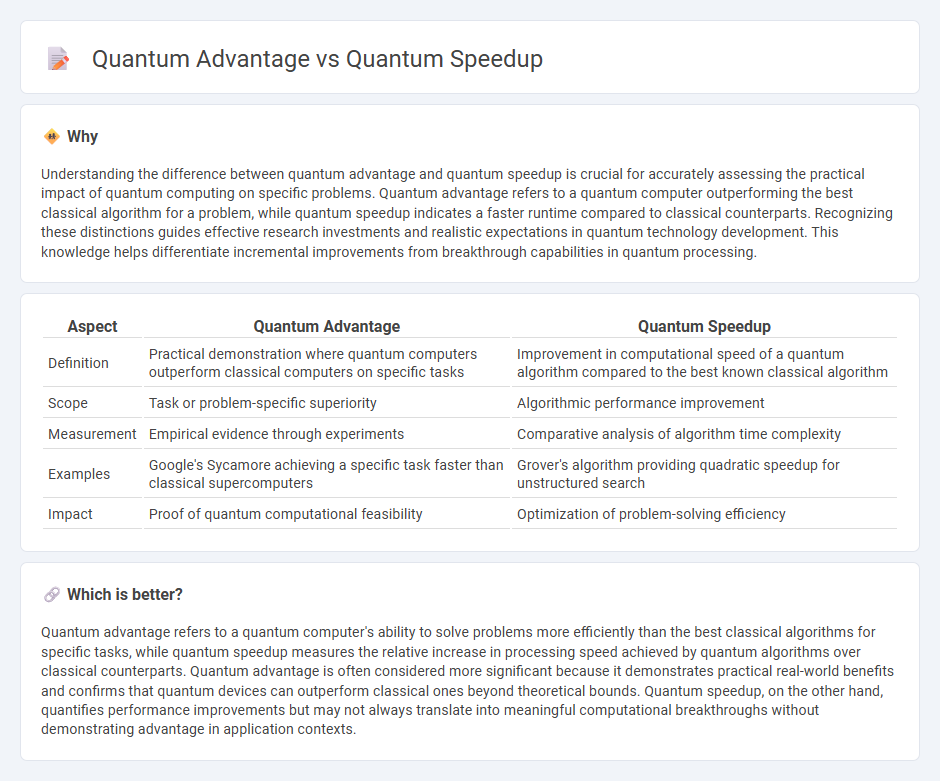
Quantum advantage refers to a quantum computer outperforming the best classical algorithms on a specific problem, demonstrating practical superiority. Quantum speedup quantifies the factor by which a quantum algorithm is faster compared to classical counterparts, emphasizing efficiency gains. Explore more to understand how these concepts are reshaping computational capabilities.
Why it is important
Understanding the difference between quantum advantage and quantum speedup is crucial for accurately assessing the practical impact of quantum computing on specific problems. Quantum advantage refers to a quantum computer outperforming the best classical algorithm for a problem, while quantum speedup indicates a faster runtime compared to classical counterparts. Recognizing these distinctions guides effective research investments and realistic expectations in quantum technology development. This knowledge helps differentiate incremental improvements from breakthrough capabilities in quantum processing.
Comparison Table
| Aspect | Quantum Advantage | Quantum Speedup |
|---|---|---|
| Definition | Practical demonstration where quantum computers outperform classical computers on specific tasks | Improvement in computational speed of a quantum algorithm compared to the best known classical algorithm |
| Scope | Task or problem-specific superiority | Algorithmic performance improvement |
| Measurement | Empirical evidence through experiments | Comparative analysis of algorithm time complexity |
| Examples | Google's Sycamore achieving a specific task faster than classical supercomputers | Grover's algorithm providing quadratic speedup for unstructured search |
| Impact | Proof of quantum computational feasibility | Optimization of problem-solving efficiency |
Which is better?
Quantum advantage refers to a quantum computer's ability to solve problems more efficiently than the best classical algorithms for specific tasks, while quantum speedup measures the relative increase in processing speed achieved by quantum algorithms over classical counterparts. Quantum advantage is often considered more significant because it demonstrates practical real-world benefits and confirms that quantum devices can outperform classical ones beyond theoretical bounds. Quantum speedup, on the other hand, quantifies performance improvements but may not always translate into meaningful computational breakthroughs without demonstrating advantage in application contexts.
Connection
Quantum advantage occurs when a quantum computer solves a problem faster than the best classical algorithm, demonstrating quantum speedup. Quantum speedup quantifies this performance improvement by comparing the computational time or resources required by quantum and classical methods. Together, these concepts highlight the practical benefits and efficiency gains enabled by advancements in quantum technology.
Key Terms
Quantum Algorithm
Quantum speedup refers to a quantum algorithm's ability to solve a specific problem faster than the best-known classical algorithms, often measured by asymptotic complexity improvements like Shor's algorithm factoring integers exponentially faster than classical algorithms. Quantum advantage denotes a broader, practical demonstration where a quantum system outperforms classical counterparts on real-world tasks, beyond theoretical complexity advantages and including noise and hardware limitations. Explore how cutting-edge quantum algorithms are pushing boundaries between speedup and advantage in contemporary research.
Classical Benchmark
Quantum speedup refers to the performance improvement of a quantum algorithm over the best-known classical algorithm for a specific problem, emphasizing raw processing time. Quantum advantage denotes a practical scenario where quantum devices demonstrably outperform classical systems on meaningful tasks, often measured against classical benchmarks including algorithmic runtime and resource efficiency. Explore how classical benchmarks shape the criteria for recognizing quantum speedup and quantum advantage in cutting-edge computational research.
Computational Complexity
Quantum speedup refers to algorithms that perform certain computational tasks faster than classical counterparts, often measured by asymptotic time complexity improvements like polynomial or exponential reductions. Quantum advantage implies a demonstrated, practical benefit in real-world problem-solving, beyond theoretical speedup, often validated through empirical benchmarks on quantum hardware. Explore detailed analyses to understand how computational complexity theories and experimental results converge on these quantum milestones.
Source and External Links
What is the significance of quantum speedup? - Milvus - Quantum speedup refers to the demonstrated advantage of quantum algorithms over classical algorithms in solving specific problems more efficiently, such as exponentially faster factorization (Shor's algorithm) or quadratic speedup in unstructured search (Grover's algorithm), by exploiting quantum mechanics like superposition and entanglement.
New research shows a potential quantum speedup for the ... - IBM - Quantum computers can provide significant speedups for certain algorithms, such as the Metropolis-Hastings Markov chain Monte Carlo, with simulated average-case speedups between cubic and quartic depending on problem size, and real-world tests on quantum hardware confirming faster performance than classical methods.
Quantum Speedup for Nonreversible Markov Chains - arXiv - Recent research demonstrates that quantum algorithms can achieve up-to-exponential speedups for sampling from the stationary distribution of nonreversible Markov chains, surpassing the quadratic acceleration previously predicted for reversible chains, with potential impact across statistics, machine learning, and computational modeling.
 dowidth.com
dowidth.com